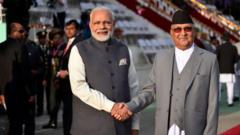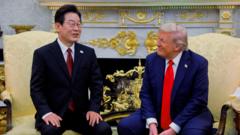Is Nepal's Turmoil Intensifying India's Challenges in South Asia?

Published: 2025-09-11 00:14:08 | Category: technology
Recent events in Nepal have led to a significant political upheaval, marked by violent protests and the resignation of Prime Minister KP Sharma Oli. The unrest, which has resulted in over 20 fatalities, stems from anti-government demonstrations ignited by a controversial social media ban. As the situation escalates, India is closely monitoring developments due to its deep-rooted historical and strategic ties with Nepal.
Last updated: 27 October 2023 (BST)
Key Takeaways
- Prime Minister KP Sharma Oli resigned amid violent protests in Nepal.
- Over 20 people have reportedly died in clashes with police.
- India shares strong historical and strategic ties with Nepal, making the situation significant for regional stability.
- The current unrest reflects broader regional instability, echoing similar events in Bangladesh and Sri Lanka.
- India must navigate complex diplomatic relations with multiple political factions in Nepal.
Understanding the Unrest in Nepal
In recent years, Nepal has experienced a turbulent political landscape, with the recent uprising marking a pivotal moment in its democratic journey. Prime Minister Oli's resignation, following widespread protests, highlights the public's growing frustration with government restrictions, particularly the ban on social media platforms that sparked outrage among the youth.
Background of the Protests
The protests erupted following the implementation of a social media ban by the government, which protesters perceived as an infringement on their rights. The demonstrations quickly escalated as citizens voiced their discontent with the ruling parties, leading to violent clashes with law enforcement.
Impact of the Uprising
The implications of these protests extend beyond Nepal's borders. Given Nepal's strategic location, the uprising poses a potential threat to regional stability, particularly for India, which has close ties to its neighbour. The violence witnessed in Kathmandu is reminiscent of turmoil experienced in Bangladesh and Sri Lanka, both of which share similar socio-political dynamics.
India's Strategic Interests in Nepal
India has a vested interest in the stability of Nepal, not only due to historical and cultural ties but also because of strategic considerations. The two countries share a border of over 1,750 km (approximately 466 miles), facilitating unrestricted movement of people and goods.
Economic and Cultural Bonds
Trade between India and Nepal is substantial, with annual bilateral trade estimated at £6.28 billion. Indian exports, particularly in oil and food, play a crucial role in the Nepali economy. Furthermore, the cultural ties are reinforced by the movement of approximately 3.5 million Nepalis living and working in India, many of whom have family connections across the border.
Military and Diplomatic Relations
Additionally, over 32,000 Gurkha soldiers from Nepal serve in the Indian army, highlighting the military ties between the two nations. As political unrest grows in Nepal, the Indian government is tasked with maintaining these vital relationships while managing the delicate balance of influence between competing powers in the region.
International Reactions and Implications
Indian Prime Minister Narendra Modi has expressed deep concern over the violence in Nepal, urging for peace and stability. His swift reaction underscores the importance of Nepal's stability to India. Modi's emergency security meeting with his cabinet reflects the urgency with which India is treating the situation.
China's Influence in Nepal
As India navigates the political landscape in Nepal, it must also contend with China's growing influence. China's presence in the region and its strategic interests in Nepal complicate India's diplomatic efforts. Analysts caution that India must be vigilant and proactive in its engagement with the new Nepali administration to prevent further destabilisation.
Looking Ahead: Potential Outcomes
The future of Nepal's government remains uncertain, and the protesters' demands must be addressed to prevent further unrest. The political landscape is fragmented, with widespread dissatisfaction directed at all major political parties. This situation presents a challenge for India, which has maintained relationships with various factions within Nepal.
Opportunities for Engagement
Experts suggest that India should consider increasing educational and job opportunities for young Nepalis to foster goodwill and strengthen ties. Engaging with the youth population, who are increasingly frustrated with the political establishment, may help alleviate some tensions.
Conclusion: Navigating a Complex Landscape
As Nepal grapples with political uncertainty, the implications for India and the broader South Asian region are significant. With ongoing challenges in relations with Pakistan, Bangladesh, and the civil unrest in Myanmar, India must prioritise stability in its neighbourhood. The current crisis in Nepal serves as a reminder of the interconnectedness of regional politics and the importance of a secure and stable environment for all nations involved.
FAQs
What led to the protests in Nepal?
The protests in Nepal were sparked by a government ban on social media, which many citizens perceived as an infringement on their rights, leading to widespread demonstrations and violence.
How does Nepal's political situation affect India?
Nepal's political instability poses a strategic concern for India due to their close geographical and historical ties, potentially influencing regional stability and security.
What is the relationship between India and Nepal?
India and Nepal share strong economic, cultural, and military ties, with substantial trade relations and open borders allowing free movement of people and goods between the two nations.
What are the implications of China's influence in Nepal?
China's growing influence in Nepal complicates India's diplomatic efforts and poses a challenge to India's traditional role as a key player in Nepal's political landscape.
What should India do in response to the unrest in Nepal?
India should engage diplomatically with the new Nepali administration and consider initiatives that support youth employment and educational opportunities to foster goodwill and stability.



